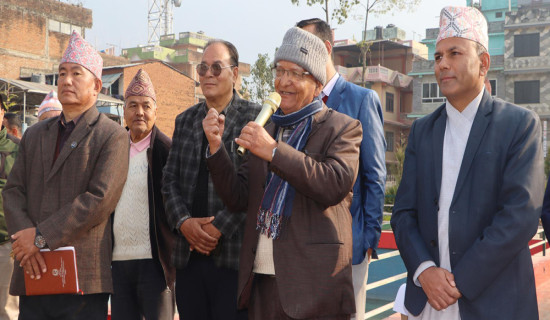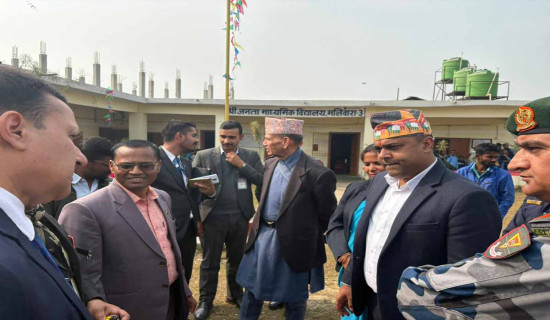- Wednesday, 28 January 2026
World Health Summit From Pledges To Achievements
Around the world, we have seen remarkable and unprecedented gains in global health. However, there are significant health inequities within and across low-income countries. The progress is still uneven as the countries have not achieved the desired progress. Consequently, a widening gap is experienced in global north and south in terms of progress in social sector. This is truly a genuine concern that demands critical discussions to identify the drivers of health inequities and prioritise local solutions.
Undoubtedly, the global context is complex and diversely challenging. In the recent years, a range of historical, social, cultural, economic, geo-political and environmental factors are enormously affecting sustainable human development. Evidence suggests that COVID-19 pandemic, natural disasters, climate change, poverty, food and nutrition insecurity, political instability and economic downturn have regressed the progress to some extent.
Priority
The global health priority must include strategic actions to realistically address the wider determinants of health for more equitable, inclusive, resilient, and sustainable global health ecosystems. While emerging issues of equity, inclusion, diversity and social justice are considered as priority agenda in health policies and strategic plans, the progress in terms of implementation and outcomes has been slow in many low-income countries.
In this context, World Health Summit (WHS) took place from October 13 to15 this year in Berlin, Germany which largely aimed at building trust for a healthier world. More importantly, the WHS offered a strategic forum for a range of key stakeholders from politics, science, the private sector, researchers, practitioners, and civil society to set a high priority agenda for building a healthier and more equitable world
Furthermore, the WHS provided a good platform for various disciplines and sectors to discuss pressing global health issues, intersecting challenges, knowledge and evidence use, good practices, and innovations in global health research, policy, and practice. In an increasingly connected world, global efforts to tackle human health challenges require trust and cooperation within and across the countries. In this context, the WHS has been instrumental in exchanging insights and experiences, strengthening evidence-informed polices, stimulating innovative solutions to health challenges, reviewing the political commitments and progress made so far, and identify key issues for actions at all levels.
Moreover, considering global health as a key political issue, it is relevant to discuss pertinent issues impacting global health in the spirit of the Sustainable Development Goals (SDGs). Additionally, the summit has underscored the relevance and criticality of harnessing international cooperation, solidarity, health diplomacy, and sustainable solutions to emerging global health challenges triggered by science, climate change, globalisation, urbanisation, migration, neoliberal economies and capitalistic policies.
Some important yet diversely intersecting challenges surrounding global health are key concerns for political leaders, policy makers, diplomats, researchers, practitioners, civil society, private sector and development partners including UN agencies. Thus, key takeaways from the WHS must be systematically reviewed, prioritised and contexualised to address the institutional bottlenecks and systemic challenges in achieving health equity and social justice.
The first and foremost, health for all is still an unfinished agenda as the low-income countries in particular continue to experience notable challenges of achieving universal health coverage and ensuring equitable quality health care for all. The fragmented health systems in many countries are further jeopardised by occasional health emergencies, pandemics and other natural disasters such as earthquakes, floods and landslides in different socio-cultural and geographical contexts.
The health of women, children and elderly is particularly vulnerable during emergencies and disasters as they lack easy access to health care services. Moreover, the community systems for care and support to the affected families are usually weak in different socio-cultural contexts. From the perspectives of humanitarian health, it is crucial to ensure that the countries have the adequate preparedness, readiness and capacity to efficiently respond the health emergencies in a more coordinated approach. Unfortunately, it is easier said than done.
In the context of SDGs, the human rights approach to health, equity, inclusion and diversity are key prerequisites for sustaining gains in health for better outcomes. Globally, planetary health is an increasing priority to safeguard the health of people and planet. Considering natural ecosystems, planetary health broadly aims to explore how communities are creating new ways to use the planet’s resources wisely to protect their health at large. In emerging economies, investments in global health is significantly shrinking. Considering geo-politics, multilateralism, and foreign policies, many countries are still struggling to secure adequate resources for health. Innovative health financing models for health system strengthening such as impact investing need to be further explored as there is a growing need to promote health in policies.
Domestic resources
Like many other countries, Nepal needs to effectively mobilise domestic resources and seek more opportunities of partnerships with other key development partners to address operational and programmatic gaps. On the other side, strengthening e-health, m-health including digital surveillance systems can be useful to track and monitor the health services and performance of health systems at all levels.
Apart from this, political economy of global health can be further explored to better understand how historical, political, cultural, and socio-economic factors intersect and exacerbate health inequities within and across countries. Learning from other countries, Nepal must strengthen governance, leadership and accountability to promote evidence-informed policies, good practices, technological innovations and transformative health outcomes in the federal context. Strengthening inclusive and equitable health systems is crucial to reach social goal of building healthier, inclusive and resilient future.
(Bhandari is a health policy analyst.)
















